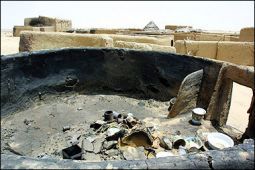Sudan’s own court for Darfur crimes to open Tuesday
KHARTOUM, June 13 (AFP) — Sudan’s Justice Minister Ali Mohammed Yassin said a group of some 160 suspects would appear before a special Sudanese court set up to try alleged Darfur war criminals.

|
|
The village of Tundubai in Sudan’s Darfur region, presumed to have been burnt down by the marauding Janjaweed Arab militias, is seen in 2004. (AFP). |
Sudanese officials said the special court would open on Tuesday, after Khartoum criticised international attempts to investigate atrocities in the troubled region.
A five-member prosecution team from the attorney general’s office has been formed, Yassin told a news conference.
He said the team would represent the prosecution on all charges against the suspects filed by investigators of crimes allegedly committed in the war-torn Darfur region of western Sudan.
Yassin did not reveal the identities of the suspects, except that 92 hailed from South Darfur state, 38 from North Darfur state and 32 from West Darfur state.
“The court will be an alternative to the International Criminal Court (ICC),” said the justice minister, adding that Sudan had prepared a letter for UN chief Kofi Annan on procedures leading up to the establishment of the court.
The announcement came a week after the ICC said it has launched an inquiry into war crimes allegedly committed in Darfur.
In a critical reaction, Amnesty International said the Sudanese court “lacks credibility” unless Khartoum carries out “serious legal reforms ensuring independence of the judiciary”.
“We fear that the establishment of the special court may just be a tactic by the Sudanese government to avoid prosecution” by the ICC, said Kolawole Olaniyan, the director of Amnesty International’s Africa programme.
“On the one hand, the Sudanese government is claiming that it is able to punish the crimes it is accused of condoning for the last two years,” he said in a statement.
“On the other hand, it continues to crack down on those who expose or criticise such human rights violations.”
Khartoum argued last week that its judiciary was competent to “carry out justice” and that a Darfur-based court would try cases of “violation of honour, murder and looting or property crimes committed in Darfur.”
The special court’s chairman, Judge Mahmoud Saeed Abkem, denied any relationship between the Sudanese tribunal and The Hague-based ICC.
But he said 51 suspects named in January as possible perpetrators of war crimes by a UN investigation would be tried “if they are brought to the court by the Sudanese committees of inquiry.”
Between 180,000 and 300,000 people have been killed and 2.4 million made homeless in Darfur since an uprising in early 2003 prompted Khartoum to unleash militias in a scorched-earth campaign.
The UN fact-finding mission found evidence of gross human rights violations, including murder, torture and rape, and recommended prosecution of 51 individuals, including security force commanders and high officials.
Most of the suspects named by the UN investigation are on the side of the government and its Janjaweed militia allies.
The UN inquiry stopped short of indicating genocide but established that crimes, including murder, torture, rape and plunder had occurred in the suppression of an ethnically-based uprising in the region.
Sudan’s President Omar al-Beshir vowed in April never to hand over any Sudanese national to international jurisdiction.
Abkem said the Sudanese court will begin work with internal “committees of inquiry” formed four months ago, adding that some suspects had been apprehended and lawsuits filed against them.
He dismissed as “unfounded” fears that the special court would not be independent because it was linked to the government.
